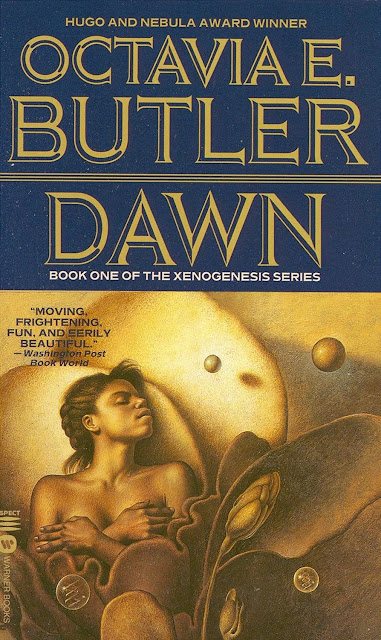Week 7 - Sci-Fi Annotation
Author: Octavia E. Butler
Title: Dawn
Genres: Science-Fiction
Publication Date: 1987
Number of Pages: 256
Geographical Setting: Earth, Within Earth's Orbit
Time Period: ~250 years into the future
Series: Xenogenesis #1
Plot Summary:
Set several hundred years after a human-induced nuclear war decimates the population, Dawn opens with Lilith Iyapo - lone survivor of her family, husband and young son, who were not casualties from the war, but instead victims of an automobile accident beforehand. Lilith Awakens in a sterile, unrecognizable room, with vague memories of the war's aftermath and who she is, but nothing more. Soon after Awakening, she is interrogated by a quietly androgynous, disembodied voice that refuses to tell her who they are, why they are holding her, and where she is; rather, they insist on receiving information on her - her background and who she is - refusal to answer is met, not with threats or posturing, but with silence - an unnerving, eerie silence which her captors seem able to maintain for as long as necessary. After days of this treatment, Lilith finally answers and when it seems they have nothing more to say, she is told the truth - roughly 250 years have passed since the human population was destroyed by the final, nuclear war, and Lilith, along with others that could be saved, were rescued by an extraterrestrial race of beings called the Oankali.
Slowly, deliberately so, and methodically the Oankali reveal to Lilith the information she desperately seeks - What are the Oankali? Why save the sparse remnants of humanity? And especially, why choose her specifically to Awaken from suspended animation...? The Oankali describe themselves as genetic traders, their race propagates by bonding with and trading genes among other chosen species, making each species better in turn. Unfortunately, once the Oankali have chosen their next evolution's species, this gene trading occurs whether the species is willing or not... Lilith is told she has been chosen to be the first among this gene partnership; unbeknownst to her, during suspended animation her genes have already been altered slightly - curing her familial tendency for cancer, increasing her overall strength and vitality - and now she will be among the first to bond with an Oankali, learn from and train with it in order to become the "parent" teacher for the first group of humans Awakened, in preparation to be returned to Earth to make a new start, including procreating - with future generations being a wholly new species - a seamless blending of human and Oankali genes.
Lilith struggles to come to terms with so many life-changing revelations, and at first refuses to accept the role of 'new Earth settlement parent', however, the Oankali won't take no for an answer. Lilith grudgingly steps into the role, fulfills her training, and begins to Awaken and train her selected group of human survivors, but fiercely holds on to a secret mantra - she and her fellow group members will survive, and they will do whatever it takes to escape the Oankali and preserve all that it means to be human.
Subject Headings:
Nuclear warfare
Extraterrestrial beings
Human-alien encounters
Genetic engineering
Evolution
Survival
Appeals:
Story Line
"Story is central...[and] contain[s] an almost overwhelming richness of concepts as well as difficult questions that unfold on multiple planes" (Wyatt & Saricks, 2019, p. 95).
Plot-driven, Own voices
Frame / Setting
"Setting is crucial and invokes otherness of time, place, and reality. Both the physical setting of the story and the inherent technical and scientific detail create this essential frame...consistently evocative and visual" ( (Wyatt & Saricks, 2019, pp. 93, 95).
Language / Style
"...employs diverse language and styles, largely shaped by the subgenre...The disorienting effect of language underlines the otherness of the worlds or futures in which SF is set" (Wyatt & Saricks, 2019, pp. 96-97).
Tone
"...furthers the SF genre's appeal to the intellect...reinforces the point of SF in general: to confront and grapple with what it means to be human, the responsibilities and consequences of exploration, and the universality of the alien" (Wyatt & Saricks, 2019, p. 98).
Thought-provoking
Characterization
"...characters...underscore issues and atmosphere. Aliens and otherworldly creatures emphasize the otherness of these stories...[they] may not dominate, but they certainly come in a wide variety and help authors explore gender, race, ethnicity, and even the concept of being" (Wyatt & Saricks, 2019, pp. 94, 98).
Pacing
"...determined by the amount of action in the story line...more physical action and adventure elements are usually experienced as fast-paced...while those...stressing philosophical or psychological elements [are]...more leisurely" (Wyatt & Saricks, 2019, p. 98).
3 Terms That Best Describe This Book: Thought-provoking, Compelling, Intense
3 Relevant Fiction Works and Authors:
Semiosis by Sue Burke
In this character driven novel of first contact by debut
author Sue Burke, human survival hinges on a bizarre alliance.
Only mutual communication can forge an alliance with the planet's sentient
species and prove that mammals are more than tools.
Forced to land on a planet they aren't prepared for, human colonists rely on
their limited resources to survive. The planet provides a lush but inexplicable
landscape--trees offer edible, addictive fruit one day and poison the next,
while the ruins of an alien race are found entwined in the roots of a strange
plant. Conflicts between generations arise as they struggle to understand one
another and grapple with an unknowable alien intellect. --Goodreads
Common Appeals
Human-alien encounters - Survival - Thought-provoking - Compelling
Rosewater by Tade Thompson
Rosewater is a town on the edge. A community formed around the edges of a mysterious alien biodome, its residents comprise the hopeful, the hungry and the helpless—people eager for a glimpse inside the dome or a taste of its rumored healing powers.
Kaaro is a government agent with a criminal past. He has seen inside the
biodome, and doesn't care to again—but when something begins killing off others
like himself, Kaaro must defy his masters to search for an answer, facing his
dark history and coming to a realization about a horrifying future. --Goodreads
Common Appeals
Human-alien encounters, First contact, Own voices, Compelling
White Queen by Gwyneth A. Jones
When humanoid aliens invade Earth early in the twenty-first century, they claim to desire only a peaceful settlement, but their presence changes the world in disturbing ways. --NoveList
Johnny Guglioli used to be a journalist, but his QV virus
has rendered him an outcast. In exile from his native America, he encounters an
enigmatic young woman. He is convinced she is an alien, and that she is part of
a small force sent to reconnoiter Earth. --Goodreads
Common Appeals
Human-alien encounters, Extraterrestrial beings, Compelling
3 Relevant Non-Fiction Works and Authors:
Extraterrestrial: The First Sign of Intelligent Life Beyond Earth by Avi Loeb
Harvard’s top astronomer lays out his controversial theory
that our solar system was recently visited by advanced alien technology from a
distant star.
In late 2017, scientists at a Hawaiian observatory glimpsed an object soaring
through our inner solar system, moving so quickly that it could only have come
from another star. Avi Loeb, Harvard’s top astronomer, showed it was not an
asteroid; it was moving too fast along a strange orbit, and left no trail of
gas or debris in its wake. There was only one conceivable explanation: the
object was a piece of advanced technology created by a distant alien
civilization.
In Extraterrestrial, Loeb takes readers inside the thrilling story of the
first interstellar visitor to be spotted in our solar system. He outlines his
controversial theory and its profound implications: for science, for
religion, and for the future of our species and our planet. A mind-bending
journey through the furthest reaches of science, space-time, and the human
imagination, Extraterrestrial challenges readers to aim for the
stars—and to think critically about what’s out there, no matter how strange it
seems. --Goodreads
Hacking Darwin: Genetic Engineering and the Future of Humanity by Jamie Metzl
Passionate, provocative, and highly illuminating, Hacking
Darwin is the must read book about the future of our species for fans
of Homo Deus and The Gene.
After 3.8 billion years humankind is about to start evolving by new rules...
From leading geopolitical expert and technology futurist Jamie Metzl comes a
groundbreaking exploration of the many ways genetic-engineering is shaking the
core foundations of our lives -- sex, war, love, and death.
At the dawn of the genetics revolution, our DNA is becoming as readable,
writable, and hackable as our information technology. But as humanity starts
retooling our own genetic code, the choices we make today will be the
difference between realizing breathtaking advances in human well-being and
descending into a dangerous and potentially deadly genetic arms race.
Enter the laboratories where scientists are turning science fiction into
reality. Look towards a future where our deepest beliefs, morals, religions,
and politics are challenged like never before and the very essence of what it
means to be human is at play. When we can engineer our future children,
massively extend our lifespans, build life from scratch, and recreate the plant
and animal world, should we? --Goodreads
Imagined Life: A Speculative Scientific Journey Among the Exoplanets In Search of Intelligent Aliens, Ice Creatures and Supergravity Animals by James Trefil and Michael Summers
The captivating possibilities of extraterrestrial life on
exoplanets, based on current scientific knowledge of existing worlds and forms
of life
It is now known that we live in a galaxy with more planets than stars. The
Milky Way alone encompasses 30 trillion potential home planets. Scientists
Trefil and Summers bring readers on a marvelous experimental voyage through the
possibilities of life--unlike anything we have experienced so far--that could
exist on planets outside our own solar system.
Life could be out there in many forms: on frozen worlds, living in liquid
oceans beneath ice and communicating (and even battling) with bubbles; on
super-dense planets, where they would have evolved body types capable of
dealing with extreme gravity; on tidally locked planets with one side turned
eternally toward a star; and even on "rogue worlds," which have no
star at all. Yet this is no fictional flight of fancy: the authors take what we
know about exoplanets and life on our own world and use that data to hypothesize
about how, where, and which sorts of life might develop. Imagined Life is
a must-have for anyone wanting to learn how the realities of our universe may
turn out to be far stranger than fiction. --Goodreads
References
Butler, Octavia E. (1987). Dawn. Warner Books.
Goodreads. (2024). Extraterrestrial: The First Sign of Intelligent Life Beyond Earth. https://www.goodreads.com/book/show/48930288-extraterrestrial?ref=nav_sb_ss_1_16
Goodreads. (2024). Hacking Darwin: Genetic Engineering and the Future of Humanity. https://www.goodreads.com/book/show/40597264-hacking-darwin?ref=nav_sb_ss_1_14
Goodreads. (2024). Imagined Life: A Speculative Scientific Journey Among the Exoplanets In Search of Intelligent Aliens, Ice Creatures, and Supergravity Animals. https://www.goodreads.com/book/show/43508672-imagined-life?ref=nav_sb_ss_5_13
Goodreads. (2024). Rosewater. https://www.goodreads.com/book/show/38362809-rosewater?ref=nav_sb_ss_1_9
Goodreads. (2024). Semiosis. https://www.goodreads.com/book/show/35018907-semiosis?from_search=true&from_srp=true&qid=GtNmY92AQs&rank=1
Goodreads. (2024). White Queen. https://www.goodreads.com/book/show/955166.White_Queen?ref=nav_sb_ss_1_15
NoveList. (2024). White Queen. https://web-p-ebscohost-com.ezproxy.monroe.lib.in.us/novp/detail?vid=2&sid=02d2eab4-e98f-4c99-9d22-8332238fd6f6%40redis&bdata=JnNpdGU9bm92cC1saXZl#UI=036786&db=neh
Wyatt, N., & Saricks, J. G. (2019). The readers’ advisory guide to genre fiction (3rd ed.). ALA Editions.









I've always wanted to get into reading Octavia Butler, but I haven't always been sure where to start. Have you read any others written by her? Sci-Fi isn't a typical genre I lean toward, but this sounds more intriguing than other post-apocalyptic novels that I haven't really been a big fan of.
ReplyDeleteThis was my first time reading Butler, and I have had this particular book on my to-read list for years. It's definitely not the "usual" post-apocalyptic story, and leans more heavily on the thought-provoking side, rather than quick/exciting action.
Delete